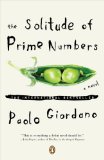Summary | Excerpt | Reading Guide | Reviews | Beyond the Book | Read-Alikes | Genres & Themes | Author Bio

A Novel
by Paolo GiordanoThis article relates to The Solitude of Prime Numbers
Prime numbers are apparently a big deal in the math world - a place I have visited but not inhabited often. Most of us probably remember that prime numbers are numbers only divisible by themselves and 1, but otherwise don't know (or care) much about them.
The ancient Greeks were the first to give serious study to prime numbers, as far back as 500 BC. After much math excitement, it seems that not much was learned from about 200 BC until the Renaissance. New strides were made again with the advent of computers that could do millions of equations to prove or disprove the presence of prime numbers yet to be discovered.
Currently, the largest known prime number has 1209780189 digits. And there are websites with lists of the largest known prime numbers.
Though mathematicians have been fascinated by prime numbers for years, there are still many problems still to be resolved. (Such as: Does the Fibonacci sequence contain an infinite number of primes? I know I'm dying to find out). While reading this book, I happened to see an episode of the television show, Numb3rs, (called "Prime Suspect," naturally) that centered on one of these prime number mysteries - the Riemann hypothesis and how to predict prime numbers. It is the difficulty of predicting prime numbers that anchors internet encryption technology, so if this hypothesis could be proven, it could have important real-world implications.
The most interesting quote I found about prime numbers is this (and if you replace the words 'prime numbers' with 'people', it works almost as well):
"There are two facts about the distribution of prime numbers of which I hope to convince you so overwhelmingly that they will be permanently engraved in your hearts. The first is that, despite their simple definition and role as the building blocks of the natural numbers, the prime numbers grow like weeds among the natural numbers, seeming to obey no other law than that of chance, and nobody can predict where the next one will sprout. The second fact is even more astonishing, for it states just the opposite: that the prime numbers exhibit stunning regularity, that there are laws governing their behavior, and that they obey these laws with almost military precision." - D. Zagier, as quoted in Gamma: Exploring Euler's Constant by Julian Havil
Filed under Medicine, Science and Tech
![]() This "beyond the book article" relates to The Solitude of Prime Numbers. It originally ran in March 2010 and has been updated for the
March 2011 paperback edition.
Go to magazine.
This "beyond the book article" relates to The Solitude of Prime Numbers. It originally ran in March 2010 and has been updated for the
March 2011 paperback edition.
Go to magazine.
In war there are no unwounded soldiers
Click Here to find out who said this, as well as discovering other famous literary quotes!
Your guide toexceptional books
BookBrowse seeks out and recommends the best in contemporary fiction and nonfiction—books that not only engage and entertain but also deepen our understanding of ourselves and the world around us.